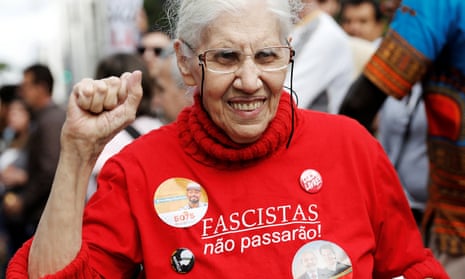He has mocked women as idiots and as tramps, as unworthy of rape, let alone equal pay. Within weeks he could be crowned president of a country that is home to 108 million of them.
But with Brazil’s highly polarized 7 October election looming, huge numbers of Brazilian women are now mobilizing to derail the presidential bid of the far-right frontrunner Jair Bolsonaro, who is leading polls with about 26% of intended votes.
“We need everyone to pull together to stop this disaster happening to our country,” said Maíra Motta, a 40-year-old philosophy teacher from the city of Vitória da Conquista.

Motta is one of more than 2.5 million women who have in recent days joined a Facebook campaign to stop Bolsonaro in his tracks. Ludimilla Teixeira, a 36-year-old advertising executive, said she had founded the group – Mulheres Unidas Contra Bolsonaro or Women United Against Bolsonaro – on 30 August as a platform to coordinate protests against politicians with “misogynist, prejudiced and truly fascist” ideas. Within 24 hours it had accumulated 600,000 members.
Bolsonaro’s son Eduardo falsely dismissed the group as “fake news” being peddled by the Guardian, and after suffering repeated attacks by hackers, the group’s administrators turned it into a secret group on Sunday.
Teixeira, from the north-eastern city of Salvador, called herself “a tiny spark” that had set off “a powder keg of indignation” across Brazil. “We thought it would grow but never that it would be so fast.”
Motta and Teixeira said members hailed from all corners of the country and all walks of life: elderly women, lawyers, housewives, trans women, doctors, authors and civil servants. They were united by a collective dread that a man with such toxic views on women and minorities might become their leader.
“It is terrifying to think we might have a president who doesn’t care about gender equality, who supports the idea that women should be paid less than men,” said Teixeira.
ProfileWho is Jair Bolsonaro?
Show

Biography
Born in Glicério in São Paulo in 1955 to parents of Italian descent, he served in the army from 1971 until 1988, when he was elected as a city councillor in Rio de Janeiro for the Christian Democratic party. In 1990, he became a federal congressman for the same party. He has since been affiliated with a number of political parties. On 22 July, he was officially nominated as the presidential candidate of the Social Liberal party.
Policies
Bolsonaro espouses populist and nationalist views that often stray into far-right territory. A vocal opponent of same-sex marriage, abortion, immigration and other progressive causes, he has defended the death penalty and the 1964-85 military dictatorship. On foreign policy, he has said he wants to improve relations with the US. Economically he says he is pro free market and privatisation.
Political style
Deliberately provocative and polarising. He has praised Gen Pinochet, expressed support for torturers and called for political opponents to be shot, earning him the label of "the most misogynistic, hateful elected official in the democratic world”. In his bid to capitalise on Latin America’s lurch to the right, he paints himself as a tropical Donald Trump: a pro-gun, anti-establishment crusader set on "draining the swamp" and cracking down on violent crime.
Controversies
On top of repeated calls for a return to dictatorship, he has made equally inflammatory attacks on women, black people, gay people, foreigners and indigenous communities. Earlier this year, he was charged by the attorney general with inciting hate speech.
Support and first round victory
Bolsonaro has a devout following among some conservative voters, who admire his promises to get tough on rampant violent crime, and won 46% of the vote in the election's first round.
“We are not against Jair Bolsonaro the human being … We vehemently repudiate the attack he suffered,” she added. “But we cannot allow someone with such highly anti-democratic positions on women’s rights to reach the highest job in Brazil.”
Teixeira said she was particularly worried about Bolsonaro’s apparent desire to make abortion laws even more draconian, but warned the “poisonous” views of a politician notorious for making racist and homophobic statements were not just a menace to women. She said: “We are his main target but we are not the only ones. Many other communities are having their rights threatened.”
Although Bolsonaro, a former army officer, has been confined to hospital since he was stabbed during a rally earlier this month, polling suggests he is holding on to a firm lead over his nearest rivals, the Workers’ party’s Fernando Haddad and centre-leftist Ciro Gomes.
But Bolsonaro’s unpopularity among female voters presents a serious challenge to his presidential aspirations. Women represent 52% of Brazil’s 147 million-strong electorate and polls show 49% oppose his candidacy compared with just 37% of men.
“He’s the candidate who has the biggest discrepancy between his male vote and his female vote in the history of Brazil,” said José Roberto de Toledo, a political journalist from the magazine Piauí, who said that in some states Bolsonaro has 75% less support among women than among men.
Bolsonaro is not totally without female support: polls show 17% of female voters back him – less than the 32% of men, but a significant number nevertheless.

Female fans post photos on an Instagram account called Bolsolindas (Bolsobeauties) and have a Facebook page of their own, Mulheres Com Bolsonaro (Women With Bolsonaro), with more than 30,000 followers.
“I love him,” said Katarina Abreu, a 59-year-old retiree who was among dozens of Bolsonaro supporters gathered at a recent beachside campaign event in the north-eastern city of Recife.
Asked about Bolsonaro’s controversial statements on women, Abreu replied: “Everyone is a little bit [sexist], aren’t they? There’s no point in lying.”
Cassya Marques, a 32-year-old advertising student at the same rally, rejected claims her candidate was a misogynist.
“He’s never said that he doesn’t care about women, that women are worth less – he never said that,” she insisted as she waved a white flag reading: ‘Presidente Bolsonaro’.
“He’s a God-fearing, family man … he’s a guy with a good heart and that’s what matters.”
